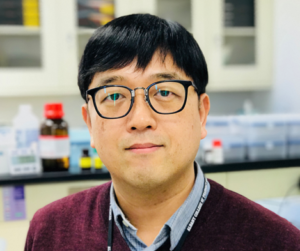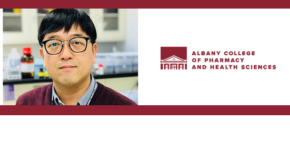 New breast cancer treatments are needed.
New breast cancer treatments are needed.
Kideok Jin, associate professor at the department of pharmaceutical sciences at the Albany College of Pharmacy and Health Sciences, discusses one that could yield big benefits.
Dr. Kideok Jin is an associate professor in the Department of Pharmaceutical Sciences at Albany College of Pharmacy and Health Sciences in Albany, New York.
Dr. Jin’s breast cancer expertise at multiscale is demonstrated by his numerous presentations in international conferences, more than 28 papers in peer-reviewed journals, and a patent on the treatment of tamoxifen resistant breast cancer.
Dr. Jin was awarded a Scholarship of Discovery Grant Award, Rudolph and Dorothy Blythe Research Award, and NIH R15 grants from NCI.
He received his Ph.D. in Cell and Developmental Biology from SUNY Upstate Medical University and was a post-doctoral fellow at the Department of Oncology/Breast cancer, Sidney Kimmel Comprehensive Cancer Center, Johns Hopkins University in Baltimore, MD.
Stopping the Cancer Crosstalk
Breast cancer is a global issue that affects both men and women. Breast cancer cells often hide, escape and avoid the immune system. Discovering how this happens may lead to new ways to stop them. Most drugs used to fight breast cancer focus on the tumor. Looking at different targets in addition to the tumor, may yield new therapies.
Our work focuses on endocrine-resistant breast cancer, or ERBC. These tumors develop resistance to the endocrine therapy used to treat about 70 percent of breast cancers.
My team is looking at cells in the stroma tissue around the tumor that communicate – we say “cross talk” – with the breast tumor. The cells in the tumor and the stroma do this by secreting certain proteins. We have already shown that the cross talk between the tumor and the stroma contribute to endocrine resistance and the return of cancer.
Now our team is working to prove a theory about how that happens. Here is the hypothesis:
The ERBC cell secretes a protein known as CCL5. The CCL5 activates the stroma cell to produce endoglin. The endoglin then spurs the tumor cell to grow.
If we can block these proteins from binding to the cells, that would stop the crosstalk – and the tumor growth. If we are right, our results could lead to new breast cancer treatments with drugs that already exist to combat both cancer and HIV. This research has the potential to reduce the return of breast cancer for thousands of women and men.
